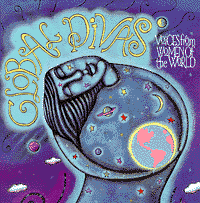

This set covers an impressive range of female talent hailing from different nationalities, musical disciplines and class structures. The term "Diva", employed in the classic operatic sense, is a tribute to an artist's queenly sway over her metier. Some of the singers represented here are glamour and sophistication personified. However, divas are also to be found among those who find dignity in humbler things. These women tell tales of the terrors and joys of love taken from folklore and from under their own skins. They recount dramas emerging from the domestic sphere, where choice or tradition situates most women at some point during their lives. They sing of aspirations for their children and of their place inside the family. Some of the performers are the product of generations of musicians and enjoy the support of their community. Others had to forge their own vocabularies, braving entrenched taboos because their chosen instrument or mode of expression was previously considered to be exclusively for men. Still others put their lives on the line by raising their voices at all, enduring ostracism or exile. The artists are defined as much by their impact on their cultures as by their gender, which is the point anyway.
Musically speaking, the set is engrossing and an education. The cuts are well selected distillations of the singers' catalogues, bridged by segues calibrated to give each tune its best shot. Ethereal soprano folk mavens ( Kirsten Braten-Berg, Marta Sebestyen) and a rasping saloon singer (Cheika Rimitti) passes through , as does a hypnotic movie star (Marlene Dietrich) and an unseen voice from films (Lata Mangeshkar). A not-so-naive country girl (Patsy Cline) and a drugged out city women (Rosa Eskanazi) proudly lament their fates as an outspoken, demure sounding heroine (Djur Djura) risks it all. A stately African goddess deals with the present and embraces the future (Oumou Sangare) while a fate-weary alto (Amalia Rodrigues) seems resigned to further disappointments. A courageous opera singer (Marion Anderson, a diva indeed) tenderly sobs a spiritual while sinuous Brazilians flick their sexually ambiguous hips at censorship (Maria Bethania, Gal Costa) and a gravelly chanteuse of the streets (Edith Piaf) runs wild all her battered, vulnerable life.
Song lyrics can be frank or elusive as the situation indicates. In many cultures, passion is enacted behind a discreet veil of metaphor and it would be unspeakably rude to state the obvious. Also, empowered female sexuality tends to oppose conventional femininity and wreaks havoc on good-girl admonitions to remain chaste. Religion and morality are fervently praised or lampooned with irony, depending on whether the woman has experienced them as a solace or a prison. Social pariahs confront dominant patriarchies and call racism by its name in the full light of day. Public forums are raised with political commentaries baldly stated or else slyly couched for safety's sake. Given their early struggles, it is interesting how many of these troublesome females were later devoutly endorsed by the authorities who tried hardest to make them pipe down.
Certain World Music aficionados may be nonplused by the inclusion of well-known Western icons and exponents of pure pop among the more obscure or rootsy entries. Well, each of these artists had to find the courage to get their message out. They found their identities, used what they had, beat the odds and spoke for the silent ones. This process can occur anywhere on Earth. Restricting the roster to placate adherents of a marketing concept would have weakened the musical integrity of the production.
In her opening essay, producer Brooke Wentz states that a portion of the proceeds from GLOBAL DIVAS will be donated to UNIFEM (United Nations Development Fund For Women). The avowed aim of the organization is to promote the inclusion of women in decision making that directly affects their lives and to help those in emerging nations to achieve economic and social equality and independence. The compilation is great listening and incidentally supports an important cause. Be selfish and do good anyway. - Christina Roden
This piece originally appeared in The Beat. Copyright 1996 Christina Roden.
Previous World Views are still available
![]()